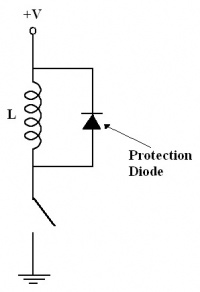Difference between revisions of "Stepper Motor Circuits"
m |
m |
||
| Line 6: | Line 6: | ||
[[image:stepper motor block diagram.jpg|500px]] |
[[image:stepper motor block diagram.jpg|500px]] |
||
Care must be taken in the driver circuit to protect against voltage spikes. Because the motor windings are inductors, switching off the power to the winding produces a short burst of voltage. To protect against this, always put a diode in parallel with the winding, making sure the diode can handle the winding current. This is shown in the following figure. |
|||
[[image:winding diagram.jpg|200px]] |
|||
Revision as of 10:46, 30 June 2006
Basics
To control a stepper motor, you have to energize each winding individually in a specific and timed order. The energizing is accomplished by a driver circuit (an amplifier). The timing is performed by an indexer circuit and the objective (go forward, go backward, brake, coast, etc.) is controlled by some external user interface, such as a computer or joystick. The figure below shows this process.
Care must be taken in the driver circuit to protect against voltage spikes. Because the motor windings are inductors, switching off the power to the winding produces a short burst of voltage. To protect against this, always put a diode in parallel with the winding, making sure the diode can handle the winding current. This is shown in the following figure.
Example Circuit
References
- "Stepper Motor Basics", http://www.ams2000.com/pdf/step101.pdf
- "Jones on Stepping Motor Control Circuits", http://www.cs.uiowa.edu/~jones/step/circuits.html

